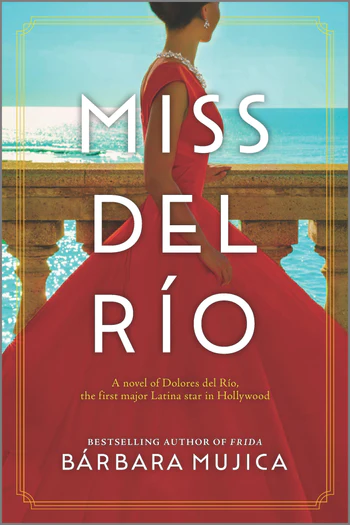When Dolores del Río stepped into the camera frame, her eyes were impossible to look away from. Her cheekbones were perfectly angled toward the light, creating romance and intrigue with well-practiced skill. Perhaps more compelling, though, is her life story.
In her latest bio-fiction novel, “Miss del Río,” Georgetown University professor of Hispanic theater Bárbara Mujica brings Golden Age film star Dolores del Río into the spotlight with captivating prose and illuminating insight.
The intoxicating story is carefully narrated by Mara, her fictional hairdresser and lifetime friend. Mujica utilizes this narrative framework to its advantage. Del Río’s side is often frustratingly flighty and shielded by wealth from true hardship. Mara is utilized to stubbornly recount a grounded perspective, though at times the system results in a plot that expands quickly.
Central to the book is del Río’s ability adapt beyond a devastating miscarriage, maddening husbands and rapidly changing times.
“They used to call her La Gatita, because she was like a cat. She always managed to land on her forepaws,” Mujica said about del Río at an on-campus event.
When del Río was a child, she and her family fled to California as the Mexican Revolution advanced toward their estate. Despite her traditional family’s protestations, del Río’s dark eyes and sculpted cheekbones seemed to pull her to the movie industry almost involuntarily.
Del Río nimbly navigated the transition from silent film towards talkies, which Mujica said was a major turning point in the media industry.
“Many many actors and actresses, whether or not they were foreigners, were frightened that audiences would find their voices acceptable or appealing,” she said.
Mujica’s book liberates del Río’s story from gossip rags and black and white films; she instead becomes a vibrant icon. The strongest aspect of the novel is the careful stitching of history and character. The reader is left with a deeper understanding of Golden Age film history as well as the connection to del Río. The bio-fiction genre suits Mujica’s scholarly background perfectly, and it is reflected in her writing.
Bio-fiction and scholarly work involve different types of research, according to Mujica.
“When you write a book like ‘Teresa de Avila, Lettered Woman,’ nobody ever asks you ‘What kind of undergarments were these nuns wearing?’” Mujica said. “But when you write a book like ‘Sister Teresa,’ you have to know that. You have to dress your character.”
In a post-event interview with The Hoya, Mujica said she wrote “Miss del Río” to highlight the contribution of Mexican artists to American film.“When we think about Hollywood and we think about Mexican immigration, we don’t think about these contributions, and we don’t think about the tremendous role that these people played,” Mujica told The Hoya.
However, del Río’s story of immigrant triumph was shadowed by her public image as a blanket “foreigner” rather than a Mexican for much of her career. She played Russian and Native Hawaiian characters, amongst other roles, according to Mujica. This social disguise makes her identifier of “trailblazer” in “Miss del Río” uncomfortable.
“She succeeded by playing by the rules. She didn’t openly rebel in the way that, say, Frida did. She was marketed as a Spanish aristocrat,” Mujica said. “When interviewed, she always said that she was Mexican. But she didn’t fight with the marketing department, either. She knew what she had to do to get ahead, and she was smart with it.”
Her eventual return to Mexico, though, does demonstrate how vital her heritage was in her identity. Del Río starred in Mexico’s first ever film to win the Grand Prix, now called the Palm d’Or, at the Cannes Film Festival.
When Mara’s husband died overseas during WWII, Mujica poignantly described the character’s grief in a standout scene from the novel. Mujica’s own personal history lent itself to writing about emotional collateral damage of war. Mujica said she is passionate about veteran advocacy on Georgetown’s campus, driven by her own experiences of her son going to Iraq.
“In my work with the veterans, I met all kinds of veterans, veterans’ mothers, and veterans’ families. I know myself how stressful it is to have a child in a warzone, and the amount of fear and stress that that produces,” Mujica said. “War affects people in all kinds of ways that don’t figure in the statistics.”
The book is a stirring story of a fascinating actress and the tumultuous time she lived in. Alongside her passion, Mujica’s careful research is evident in her work. “Miss del Río” is a must read.














